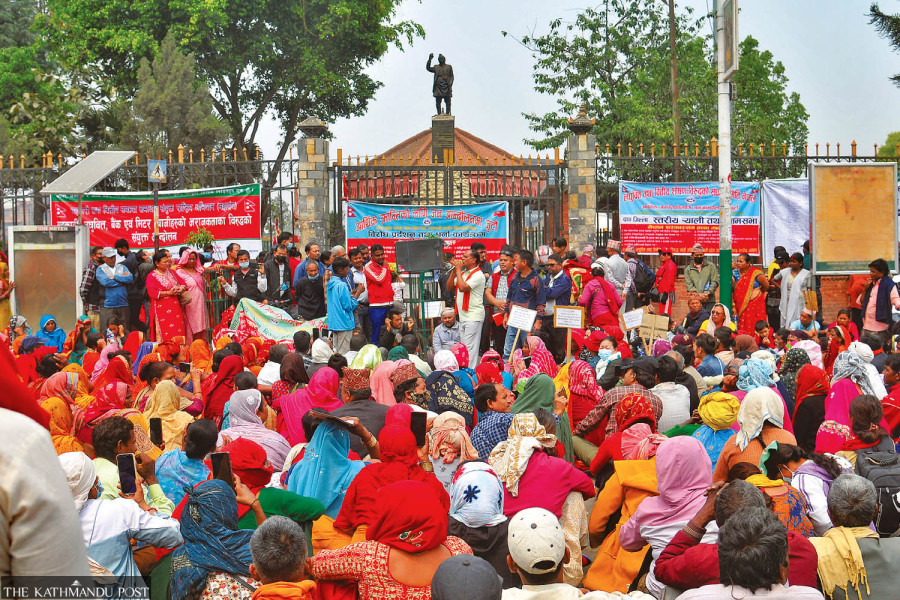National
Cooperative victims call out government inaction, broken vows
The National Cooperative Regulatory Authority, which was expected to address the concerns, has not done much.
Purushottam Poudel
The government has reached multiple agreements with the victims of cooperative fraud over the recovery of their savings. In its annual budget endorsed by Parliament a year ago, it promised to return the depositors’ money from fraudulent cooperatives.
But the agreements as well as announcements remain unimplemented.
When the government failed to act on its earlier commitment, the victims took to the streets, claiming they had not been contacted for any dialogue.
“It’s been over two weeks since our agitation began, yet Singha Durbar [the federal government secretariat], situated near our protest site, has shown no willingness to engage with us,” said one protester. Those defrauded by cooperatives continue to demand the return of their savings, accusing the government of reneging on previous pledges.
On Monday—Nepali New Year’s Day—cooperative victims gathered for the 16th day of protest at Shantibatika, Ratnapark. This time, nearly 900 microfinance victims joined them in solidarity.
“On April 7, we submitted our grievances to the Office of the President and the following day to the Prime Minister’s Office. Yet the government has made no effort to contact us,” said Kushluv KC, chairperson of the National Campaign for Protection of Cooperative Depositors.
Successive governments have signed at least three agreements with the protesting victims, but most remain limited to paper.
Although the government in January formed the National Cooperative Regulatory Authority (NCRA) via an ordinance to address the victims’ concerns, complainants say the body has failed to take meaningful action even two and a half months after its inception.
“Following the establishment of the NCRA, we believed it would start reimbursing depositors as per earlier agreements, but that hasn’t happened,” KC said. “This inaction has forced us back onto the streets.”
Despite being formally established on January 27, the NCRA has made little progress. The cooperative ordinance was issued on December 24 last year to replace the National Cooperatives Development Board, among others, to expedite resolution of cooperative-related issues. Parliament passed the ordinance on March 5 and the replacement bill on March 31, but the urgency the government promised has yet to be seen.
The special parliamentary probe panel formed to investigate the issues of crisis-ridden cooperatives had suggested forming a powerful body to oversee cooperative issues. The cross-party House panel, while submitting its report in mid-September, had suggested the government to form such a panel within three months. Also, experts had pointed out the need for an all-powerful autonomous regulatory authority to resolve the crisis in the cooperative sector.
Such a powerful body was suggested in order to monitor and regulate cooperatives across the country. According to a government estimate, around 3 million people have been associated as members in over 34,000 cooperatives operating across the country.
Arjun Prasad Pokharel, secretary at the Ministry of Land Management, Cooperatives, and Poverty Alleviation, admitted that the new authority is underperforming. Pokharel had been heading the NCRA temporarily. However, he is due to retire from civil service on Tuesday.
“Once I retire, the NCRA may temporarily lack leadership,” Pokharel told the Post. “Nevertheless, we have finalised the structural process and will soon begin establishing the board.”
Alongside Pokharel, Guru Prasad Paudel, an executive director at Nepal Rastra Bank, and Madan Koirala, a joint secretary at the cooperative ministry, were appointed to the NCRA in January. However, the other board positions remain vacant.
On April 11, former finance secretary Rameshore Khanal submitted a 478-page report on economic reform to the government. It included a 12-point recommendation on cooperative reform. The report suggests reimbursing depositors up to Rs500,000 and restricting travel for cooperative operators.
The government had previously announced similar measures while unveiling its 2024-25 budget on May 28. Yet it has failed to implement them.
Nearly a year after unveiling the budget, officials cited lack of operational guidelines as a reason behind the government’s failure to implement its announcement made in Parliament.
KC also lamented that the new law introduced via the ordinance further victimised depositors. The amended law significantly raised the threshold for filing a complaint from 25 individuals to 25 percent of total victims of a cooperative.
Secretary Pokharel refuted this claim, stating that the number of complainants is just one of five criteria used to determine whether a cooperative is problematic.
“There are five criteria under the Cooperative Act 2017. While the new law did raise the number of required complainants, we do not base our decisions solely on that figure,” he said.
However, KC argues that resolving the crisis will require action beyond the scope of the existing law.
“If the government cannot resolve our problem, it should concede its failure,” KC stated. “We have developed our own set of solutions after analysing the cooperative data. We will reveal our proposed solutions if the government officially admits its failure.”
He declined to disclose those solutions, fearing that cooperative operators might take preemptive action.




 18.12°C Kathmandu
18.12°C Kathmandu














